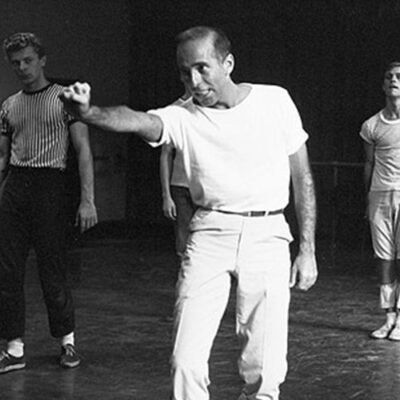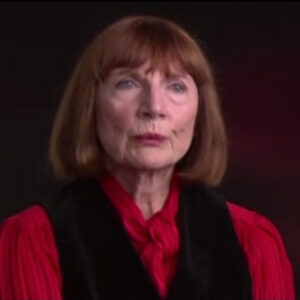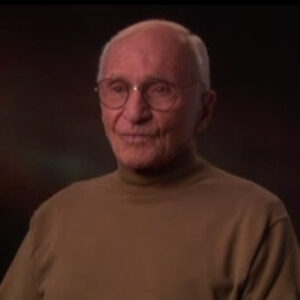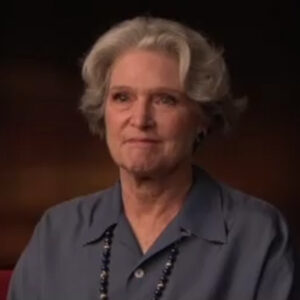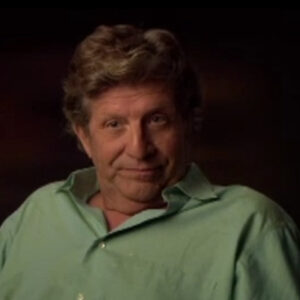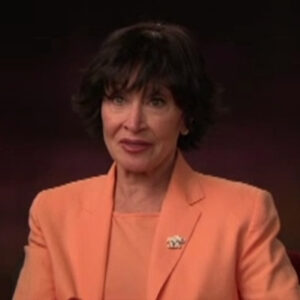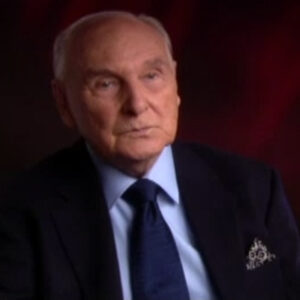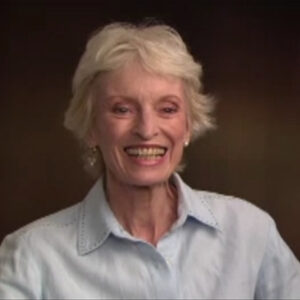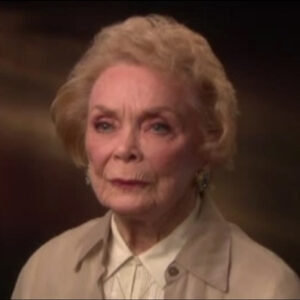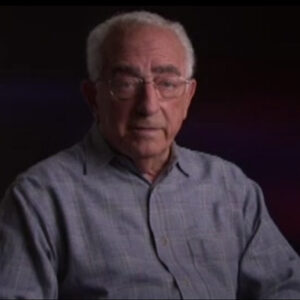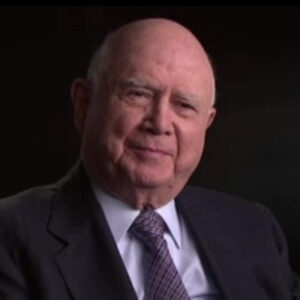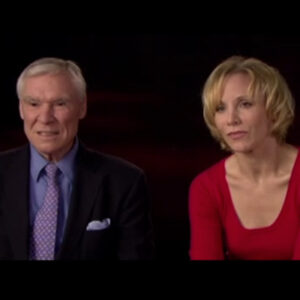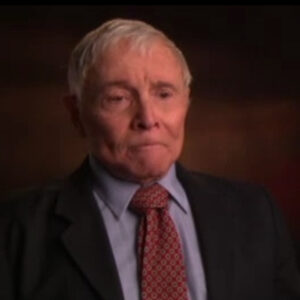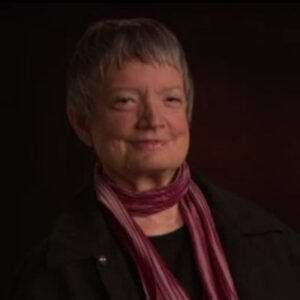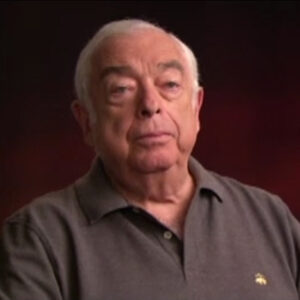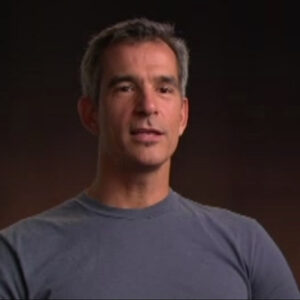Speaker The very first audition for West Side Story was arranged by the William Morris Agency, and it was a cattle call for anybody in their client list that might be juvenile delinquent, looking young enough to look like a Maria or Anita. And if it was held in Cheryl Crawford’s office, so her ante room was filled with what looked like a getting ready to go to jail time. All the leather jackets and the meanness was going on with the boys, were not talking to the and the girls were pristine. I wore my pink shirt, waist, dress, and my hair was in a ponytail, which stayed because I was told that they identified, oh, she’s the one in the pink dress. You come back in a plaid suit, they’ve lost you. So I was there. And Bruce Savan was Charlie Baker. Charlie Baker was the head of the legitimate department and had discovered me in Highland Park and doing Brigadoon with Helen Gallagher, OK, was her age. And she said, Charlie, I love Helen Gallagher. She was so adorable. And she’s still working and teaching brilliantly. At any rate, Charlie was my agent and he thought I was right for Maria’s, along with 12 other girls in his roster. So Bruce Savan, his assistant, on the other hand, thought I was not that I he knew me as a dancer, but he didn’t think I had a legitimate coloratura opera, Leonard Bernstein style and voice technique. So he was the keeper of the torch that brought each person in and he had a clipboard. He was superefficient about this guy.
Speaker So he would say, all right, I need another Tony. I was next. Oh, all right, Sam, would you.
Speaker And then he would they would say next and he would bring them in and introduce the person and then leave. And so he said, All right, Carol, your next what are you going to sing? We we’re told to sing our favorite audition piece. So I was going to sing. When does this feeling go away from Make a Wish, which is charming and warm and sweet?
Speaker He said, all right. I said. And if I get beyond that, because if you made that hurdle, you had to sing an aria, you had to have one prepared to go. I said, and if I am asked, my aria is unbuild. And he said, unbelted, are you kidding me? You’ll never make don’t sing it because you’ll never make. And at that point, really confidence building, isn’t it. And the door opens. I said, next. So we walked in. He has a clipboard and he said, This is Carole Laurent, blah, blah, blah. And it was, believe me, a terrifying experience because it was a long, narrow room, the end of which was a big mahogany desk, very beautifully carved. And behind it was Cheryl Crawford, all in black. She always wore black. She looked like the judge. All she did was the robe. And she nodded, smiling. Miss Crawford, how do you do? And on a little settee right here, like a jury box, it was like a courtroom is sitting. Jerry Robbins, Arthur Laurents and Leonard Bernstein looking more beautiful than any eight by ten you have ever seen. I mean, he he had a cape and your left kind of speechless because, you know, and he’s right a foot and a half away from me because of Virginia and the Springer piano behind me. So Peter Howard, the wonderful Peter, how it was my rehearsal and also my audition pianist. So Peter sat down and I said, when does this feeling go away? Lovely little lyrics on the end of which Lenny said that was fine. Now, Miss Lawrence, would you sing an aria? At which point Bruce Savan, my agent, said an aria. Oh, my God, no. And he turned around, put his hands over his ears and knelt down in the corner facing the corner like a child being punished. And everybody just looked for a second and could not believe it, that he would do that. And thank God Peter Howard went right into the introduction to MLT and somehow I sang it a foot and a half from Jerry Robbins and Leonard Bernstein’s nose got through it. Lenny stood up with all the majesty of King Arthur, took my hands and said, Miss Lawrence, that was beautiful. And he turned to Bruce and he said, And you, if you will get up from that ridiculous position, I would like to hear her sing that in a theatre next time. All right. Well, I almost kissed him. I wanted to take him home. I wanted and then, you know, she said next and we I went out. But that was my first crack at West Side Story and.
Speaker Everybody knows that later on, after many months, Cheryl Crawford decided that she could not go along, that she just didn’t believe in it, and sadly, she decided to tell them that she was leaving the troop at night after her work.
Speaker And so call them to her office to hit them over the head with the fact that they were now producer less. And they went out on the street and in Lenny’s wonderful a journal that he kept. Thank God, he said, we all felt totally abandoned and lost. We just didn’t know what to do. And I’m not sure whether it was Arthur Laurents or Stephen Sondheim who called Roger L. Stevens in London. They went to a payphone and said, what are we going to do it? It’s over. She left. And we we’ve brought it to every other producer and they’ve turned it down. And he said, whatever it takes for you to continue, I will cover. And he literally saved West Side Story from the chopping block because they they were like they had truly exhausted their avenues of getting more support. And he did. And they continued and we have a show that was my first audition.
Speaker OK, so you got a callback. So tell me what happened.
Speaker Oh, I got many callbacks. I got 12 more callbacks. I did two shows in the interim. And, you know, you could get too old for the part waiting to be chosen because Jerry always wanted us to look 14, 15 and with good makeup and wonderful lighting to ask you to come back. Oh, we have a motorcycle. This is the door closed.
Speaker Is everything closed down? Yeah, everything’s good. Everything’s just coming through.
Speaker OK, OK, so I’m going to go back so. Yes. So you had your first audition, right? Yes.
Speaker Jerome Robbins had a very difficult time looking for perfection because that’s what he demanded he would settle for, the closest he could get. OK, and everybody around him knew that. I didn’t know that. I never I admired him and I knew what he had done, but I didn’t know the intensity with which he approached his work. And that’s why he was such a successful genius. There are many geniuses who will let it, you know. Well, that’s if that’s as good as it’s going to be, not you know, he just he was a bulldog and it was very painful. But he took two and a half years to cast the show and you could literally get too old for the part. And in the interim, I did a whole show with Lily on Broadway out of town rehearsing it. He just kept auditioning more people. And then I came back into town and I was asked to come because now Cheryl was out of the picture. And, of course, they brought it to Helprin’s and Bobby Griffith, who are out of town with, I believe, Redhead and Gwen Verden and new girl in town. OK, I my history lesson is being wonderfully corrected and rightfully so, because you need to get this right. As Jerry would say, Jerry called me back and I began auditioning. I got to learn tonight and I don’t think I ever did pretty, but I was getting music. And you would audition with someone, they would hand you the piece of paper. They guarded the script as if it were, you know, I don’t know, the newest atomic bomb or something. And then they would rip it away from me. So you were with this funny little piece of paper and they would give you about five minutes in the hallway with whoever it was you and. I’m not good at embracing people and holding the paper, so we went through 12 more auditions and on the 12th one Jerry said, and I’d like you to come back again with Lawrence next weekend where I got the guts to say this, except that I was really tired of coming back into that black monster with the same people in the audience doing the same with. This person changed, but OK, so I said. Mr. Robbins, I would be happy to come back, if you will let me have two pages, one page of whatever scene you want to see and the telephone number of the person with whom I will be playing. And he paused as if I had just asked for his left kidney because, no, I guess nobody else did that. But I found out much later that he loved when people stood up to him. You had to do it carefully. And if you yelled, I guess I never heard anybody yell at him. I never, ever heard in our company a person oppose him. He was definitely it was his concept. It was his book. It was his dancing. It was it Jerry was the czar. And there was no competition in any of the collaborative people, which was really marvelous because we never saw, like on shows that I did later these explosions where collaborators were out to kill each other in public and you talentless, whatever. And the the artist is standing there. The person who has nothing to do with making the changes except playing it is I was always so embarrassed. I never knew what you couldn’t make it better except to just sit and not at any rate, Jerry said with a long pause. Nothing to me turned to Ruth Mitchell, his stage manager said, Give her the balcony scene and Larry Kert telephone number. So I called Larry and Larry had never done anything up until then except chorus. So he was. And we fell in love on that balcony because Jerry ordered us to mean you did what Jerry said. And truly, I have never known an actor more hard working, charming, talented, kind, funny. Larry and I were truly in love from the moment we said hello to the last meal I fed him. And that’s another story that I can’t really talk about right now because I’ll cry. Uh, the point is, Larry and I met for just one time. I said I gave him the script. I said, please memorize it and let’s then run it a couple of times and maybe we’ll embrace here. We’ll kiss there. It was the balcony scene. And so we felt good about it. We came in the next week. We walked on stage and Larry and I held hands because it was scary and it was getting to the end. You knew it was going to go into production soon. So this was important. And Jerry Robbins took back his control. In one second. He said, Larry, I want you to get out of here, go through. I’ll close a steel door. I don’t want you to hear what I’m saying. And I’ll I’ll ask you back. When I went to see Larry was gone and he said, I want you to hide somewhere on the stage, I’m going to bring him back and he will sing Maria and when he finishes it, do the balcony scene.
Speaker So that was typical of Jerry because he kept always putting obstacles in front of you and seeing how quickly you would be able to surmount them throughout the entire rehearsal. It was that way. He believed in the status. Lafsky And it was now when you had to have all kind of subtext. So I look, there was not a piano on the stage. There was not a piano stool. There was not even a work life. There was nothing except that we were in a regular theater and the back wall was real brick, out of which there was a cropping, a semicircle of iron, like a little magnifier shape because it was weightless while it was about three feet and it had a little railing on it. It was for the vaudeville shows. We had to just pick your head out and you could hear what was going on. And then there was a little ladder that was falling off the wall that if you were late, you could scamper down. And it was for the kids who had lots and lots of cues that were way upstairs and didn’t want to go all the way down to the floor, to the stage. So in my little pink shirtwaist, I climbed that rickety ladder. I stepped over the banister and I knelt down on my knees in a fetal position to be as small as possible. Nothing was said. They called Larry and he said, I want you to sing Maria. She’s somewhere in the theater. So after you sing it, find her and then do the balcony scene. So Larry sang the whole thing, the whole song looking for me. He didn’t see me because I was 15 feet up directly behind his head and you don’t sing with your back. So he went over to the pit. Oh, Maria, are you down there? Of course I wasn’t. He went to the wings and finally I’d had it and I stood up and I said, Tony just whispered. He turned around and became Spider-Man. I have never seen he didn’t even see the little ladder over here. He went up on this side with his sneakers and his fingernails and he climbed the wall. I reached over, pulled him onto the little perch. And it was perfect because we weren’t sure it could hold us. We were nervous. It was absolutely the right feeling of what the balcony scene became. And we sang it and we kissed and he left down. We sang good night, good night. Sleep well when you dreaming. And he walked off. And then they stood up and applauded and the wonderful Leonard Bernstein walked down to the foot and he said that was the most mesmerizing audition I have ever seen in my life. And I was still up on my little perch and they said, Larry, that’s it. Well, we’ll talk to you later. And so I didn’t know how I was going to get down. And Leonard Bernstein said, you have the part. You are Maria. And I started to cry and he said, no, no, no, it’s OK, you’ve got it. And I said, Do you know what a relief it is to know that next week I don’t have to come back. It was my 13th audition. And later Equity found out that I had done all those auditions. And they said, why did you. They were adamant that I should have said, that’s enough. You should. And I said, if Leonard Bernstein and Jerome Robbins, I thought, all these people want you to come back with a part of a lifetime. Would you say no? Well, that shouldn’t be that many. And they made a law for a while. It was called the Carol Lawrence Law. And it states that an audition, a person auditioning can only be seen three times without then reimbursing paying them to come back. And oh, it’s see, I it’s against everything that an actor wants and that is to be seen and to be allowed to impress or to to get the job. So I, I don’t believe in the law equity, but you just take whatever you like.
Speaker It’s amazing the jury sort of concocted that scenario.
Speaker Yes, he was brilliant at scenarios and would pit people when we began rehearsals, the Jets and the Sharks in the in the wonderful gym, down to the gym, just their colors, purple and red and black and cheetah and Kenny Leroy doing that, the mambo. Nothing could touch that. And Peter De choreographed that for which he never really got the kind of really accolades that he deserved. But Jerry always felt that the blue and yellow, the little jets and Mickey Callon never quite challenged them. So in the prologue, in the rumble and all that, he would have 16 bar phrases that were free fighting. We’re not quite that now. It’s all kind of choreographed. And when I see a company, I don’t see the bedlam. I don’t see the blood. I don’t see this. We literally had people Jane Norman was need in Washington, D.C. and he had 17 stitches in his forehead. But you know how you bleed from the forehead. And at the end of when the whistle went and everybody had to scramble to each side, he couldn’t see and he couldn’t recognize their faces because his eyes were full of blood. And he said, the only thing I was worried about is if I crawl to the wrong side, Jerry would kill me. So he said some somebody help me. And, you know, they dragged him. But we had a doctor in attendance in Washington, D.C., because Jerry insisted that they do damage to each other and he always wanted more revenge. And he would make up stories he’d say to somebody, you know, Mickey told me that your mother was a hooker. Is that is that. And go what? Oh, maybe I shouldn’t have told you. Oh, please don’t tell him I told you because. Well, the next time they see Mickey, he’s after blood. And they’d say, what are you getting? So remember, he said, well, you shouldn’t have told him that my mother’s a hooker. I didn’t. Jerry was notorious for that notorious. But he got you know, he and people always say he was terribly mean and cruel and he only had a way of criticizing you in his tremendously articulate but sarcastic tongue. And nobody could tell you you were rotten as well as Jerry or humiliate you. And in a dance company, which is where his background, of course, started and from which he learned how to get the parts. And he was a wonderful character, I’m told. I never saw him dance in a ballet. But his Petrouchka and all of those character driven roles came from his being shorter, too short of company, I mean, to to partner. And the fact that he was not a beautiful man. He he was balding very early so he could from his Corda Ballet by telling them they were insufficient. You stupid idiot. You can’t dance, you can’t leave. You get you come from the rebellion, which is a dancer’s only tool to prove that you’re wrong. And you do dance better, you leap higher, you turn your head. And he’s won, hasn’t he? He really has. And he tried to apply that to us as actors by saying you’re just, you know, you don’t know how to use it. He said to Larry Kert, you don’t know how to use your hands. So I never want to see them put them in your pockets for the first six months. Larry is a Eisenhower jacket, the team jacket, the get gang jacket with his unless they were around me, they were or painting the latter, you know, it. But what it did to his sense of strength on the stage was the demoralising, the destructive thing. And Jerry thought, well, he’ll learn how to use it. I don’t know what he thought, I’m guessing, but. He he he would truly beat us to a pulp, and when we were working alone, we were in Washington and we had opened and he took Larry and me to do the killer or killers scene where he comes into the window. And I realized that indeed he has killed my brother. I leap at him and I pound him on his chest. Killer, killer, krca. Well, I’m a very strong dancer. And he he loved when you did it for me, you really hit somebody.
Speaker We came to we were alone in a room in the balcony. And Jerry said to me quietly and always, you know, tells you like this and the other person isn’t allowed to know, like Larry wasn’t allowed to know where I was when they auditioned. So he said he doesn’t feel guilty and I’ve hit him harder. OK, so we did this for two hours, Larry would come in, I would hear him, I would hear him and I’m crying and he’s. Dying with the pain, but you never allowed to even admit that you’re in pain dance, who never does that? So we finished, we went to dinner. I was in my dressing room putting on makeup and the knock at the door, I said, come in.
Speaker It was Larry naked to the waist. And he has his little blue jeans on his whole chest was taped white, big white tape.
Speaker And he was leaning against the door, I said. Were you in an automobile accident? What happened to you? You said no, I had to go to the doctor and he could barely talk. He said I was in so much pain. After the rehearsal, I went to the doctor and the x rayed me and he said that you are loosening my lungs from the rib cage and you can’t do it anymore. But I’m afraid to tell Jerry. So will you tell Joe? I said, why do I get all the good jobs?
Speaker And I had to go get well.
Speaker Now, Jerry came in and I said and I was crying because I loved him so much. I said, I can’t hit him in the chest anymore because I’m literally loosening his lungs from the rib cage. And without a second pause, he said, well, then hit him in the head. You won’t hurt anything there.
Speaker And that’s what I did until he healed for about two weeks, I’d go kill her.
Speaker It was unbelievable the first time his understudy went on because Larry was heard in the rumble and he was taken to the hospital. Don McKay, who was his understudy, came through the window, which I had never rehearsed with him. There was no time to rehearse. And he had been rehearsing with Marlis Waters, who was this beautiful soprano. She did it in London, but frail as a whisper. And I went to him and I hit him like I hit Larry. I said killer. And he fell to his knees. He just, you know, like this. And the audience laughed. I think I knocked the scenery off, but it was not supposed to be a funny.
Speaker I picked him up and we finished the scene. My goodness, you are strong. So I had to modify it a little to Larry came back. So that’s but we would come out of a.. Not an audition. A rehearsal with Jerry, where we were really totally demoralized as actors. And Lenny so often would come and put his arms around us and say, why don’t we go and do the balcony scene? Because, you know, he was always encouraging. He was a teacher. He was my mentor. And we’d say, well, we don’t have a pianist. And he said, well, I think I do remember the score. So why don’t we just find a piano? And he would literally nurse us back into feeling worthy to be on the stage. And I will never be able to thank him enough. I just miss him. So to this day we were singing the balcony scene or something and he took my face like this and he said, Oh, I never thought it could sound that beautiful. But if it doesn’t feel good in your mouth, tell me, because I’ll change it. Well, are you going to change a masterpiece and are you going to tell this angel that has given the world so much joy and beauty to a grace note, I wouldn’t change.
Speaker So he was our savior. He was the opposite side of the coin from Jerry. And thank God he was, as was Peter, Peter DeNiro and Jerry Friedman, who literally worked on the scenes. And Arthur Laurents, they were all, I guess, so aware of how ravished we were.
Speaker And it was a violent show and it was difficult. And he did. Create something that had never been done before, so everybody says, well, you have to know that he was right doing that and I want to say what would have happened if just once he said that was a good what? I mean, coming from Big Daddy, because that’s what he was called Big Daddy. Would have just set us another foot above where we were dancing, and that I think would have been magnificent, but he wasn’t capable.
Speaker And you learn that excuse me. You learn that once you’ve.
Speaker Read his the books about him and his childhood and his abuse. That’s the way he was taught. And so that’s where we live. And and I’m grateful, so grateful to him, to every one of the collaborators. And I hope that one day there will be an acknowledgement of.
Speaker The really artistic.
Speaker Landmark West Side Story was and I hope we can, because this is the fiftieth anniversary, I hope to be able to do that on somewhere else, please.
Speaker So what inspired them on this visit? This is the first time we never had any problems, are we? Seven minutes. That just means we’ll take a break and change tapes. Gotcha. OK, so, um. And we were talking about. You had written in your book, actually never have I worked with anyone more tyrannical than Jerome Robbins. And you were just talking about that? Yeah, very well. And yeah, he’s through you look. Tell me about that.
Speaker Jerry Robbins was about six or seven men rolled up into one, and it just depended upon the circumstance if you were invited to his home, which was magnificent, beautifully, artistically decorated, he was the most charming host, generous, kind, witty, warm hearted. The first time I went to his home, it was a shock to me because I was not aware of his really diabolically opposed character.
Speaker And when I had my birthday September 5th, we were out of town in Washington. And Chita said, because we dressed in the same room, why do we hear it’s your birthday?
Speaker You want to go out for a little drink afterwards? I said, Oh, sure. So I figured it was going to be Larry and Chita and maybe Tony. And we walked into a Spanish restaurant and the whole company was there and they all yelled, surprise.
Speaker I said, Gee, how sweet of you that’s so dear. She said, It’s not me.
Speaker It’s Big Daddy. Big Daddy, it. And I said no, and there he was laughing and we had margaritas and a wonderful Mexican dinner and I was beside myself, he was so adorable. Next morning, you know, that you come in to do a complete bar every morning was a class A. a warm up and a ballet bar that he gave or his assistance because he’d jump into whatever it was and you had to be warm otherwise, you poor thing. So that was wise. And he was on stage always before anybody. So I got there early and there was nobody there. And I said, Jerry, I just want to thank you one more time for.
Speaker And he said, Maria, I have no time for such nonsense.
Speaker And last night he was and he didn’t because he was already when you were on his what he called battlefield. And that’s what the stage was, you know, that the jets were on stage left and the sharks were on stage. Right. And while you were rehearsing, certainly before or after you could talk to anybody, we were not allowed to have anything to do with each other. And Jerry Robbins. Would do things to fortify the Jets, he went out one lunchtime and bought them all fedoras on Broadway that said Jets, you know how they embroidered the name of whatever your name and they walked in with those fedoras? Well, now they had a unity we didn’t have. And although I wasn’t involved in the fighting, I was never allowed to even see the rumble. I was ejected from the theater. So at my Italian temperament, how dare you do that and not give us something, so I went home that night and bought some felt, black felt and grey felt, and I cut out the shape of a shark and I sewed the button for the eyes. And I made a bigger one for about an hour ago because he was my brother. I never knew that Kenny Leroy wasn’t Mexican because he never spoke to me without an accent till opening night when his very Jewish mother said, You are so wonderful. Oh, my skin is just so lucky to have. I said, you’re who? You say, Well, my son is Kinealy. Hi. I said, you mean you’re Jewish? Well, of course I’m Jewish, Kenny Le Roy never let on. He was so brilliant, though, at any rate. So I made a bigger one for Kenny. And then I. I had a little fake roses. I wired them so that there was a place and the bobby pins I gave you, the girls were going to have a rose coming out of their head, standing up straight, and the boys were going to have a shark on their t shirt or whatever they way in Kenny’s was going to be bigger. And so I got there very early. I went to the boys. I gave it to George Marshall, who was Kenny’s understudy. George was up for anything. I loved George Marshall. And I said, George, you and these are the guys that put him on right before the bar. Don’t put him on early so that just see them and I’m going to give the girl the rose. He said, great. And so I I’m in the handing out the roses to the sharks girls. And they said, Kenny wants to see you. I figured you say thanks for doing this is a great idea. He took all of the shuttlecocks and he threw him in my face. He said, I want you to know that I am the leader. You are not anything in this thing. Do you understand me? If anything is done, I will do it, not you. And he walked away. I had to collect all the roses. I had to pick up the sharks. But that’s how important it was. Every second of preparation was life and death. And very often, I mean, George Morrissey broke his femur on stage in Rumball and nobody would count would help him. And he kept saying. And he was coming, you know, through it was a compound fracture. He was in excruciating pain and everybody was just frozen. Nobody would go and break character and carry him off.
Speaker I think the jury at one point, right. May have told you about an episode in his time, in his childhood when he had a.
Speaker Never I saw the puppets in his house, and I know you said that’s what he wanted to be, that’s where it started. He wanted to be a puppeteer. I was married to a puppeteer at the time. You know that on Captain Kangaroo, I made all the puppets. So I understood his attraction to them because it’s complete control and there ain’t no talking back from a puppet. And there’s no not even the expression Jerry. Well, do you want do this on the air? Because he truly choreographed the dramatic scenes, the songs, OK? And we we had count upon which we would look that way. And most of the time they were motivated by, of course, the lyric. And he was trained at the Actors Studio. That’s how West Side came about when he was directing Montgomery Clift in the balcony scene from Romeo and Juliet. And he Monty didn’t know how to do it. He said, Jerry, can you come in now? And suddenly he said, wow, this could be done today. And on the east side between Jews and Catholics and and was East Side story, which no. And when we are all of our scenery was was named gang gangway, remember. So there were a million evolutions that the West Side took, but I’m not surprised to hear that he had his own puppet theater. How old was he? Oh, my goodness, no. OK, that’s interesting. Now, he never told me that, OK?
Speaker No, he told me a couple of very sad stories about his mother who who was just very cruel to him and would when he was naughty, she she would get on the candlestick telephone and hold down the receiver. I mean, the the thing and she’d say, no, I want the information for the orphanage down in Manhattan. Yes, I have a little boy I can’t control. I want you to go. I’ll have his suitcase out and he’d be grabbing her leg. Mommy, mommy, please. I want. Who could. Be under the duress of knowing that your mother would do that to you. Oh, I can’t imagine my mother was such an Italian cajoling, loving, caring person, excuse me that what else did he tell you?
Speaker Well, that she never really approved and nor his father, once he got into the ballet world and I guess admitted to them that he was gay. His father rejected him. And I know that that’s something that gay people have to face all the time, even in today’s world. And that’s just stupid and idiotic. But I know that Jerry was terribly damaged by that. And so he was always defensive that you as a woman was also going to reject him and abandon him. I gave him a birthday party, a surprise birthday party at my home with a whole cast, and he was blown away. I told him he was just coming over for spaghetti and meatballs. And I had a beautiful cake and everybody was there. And he said, You are the only person in my life who is giving me a birthday party, let alone a surprise birthday party. And he laughed. I have pictures that are the dearest to my heart because I was making him laugh and he was he enjoyed it. He said thank you a million times to me. And it was one of the happiest times I remember. Cheeta was there, very pregnant and about to have Lisa Mordente and.
Speaker What just happened? I feel like a big air conditioning vent, just put it out of the here, but yeah, he you know who Murielle Bently are you?
Speaker Is she still alive? I hope no, she she was she replaced somebody and didn’t need her and she was in his first ballet on the town and no fancy free from which on the down and he hollered at her, I don’t want to say this on the air. He know because it’s not like he just berated her one night after the show because he would come in unexpectedly, we’d know there and give everybody notes.
Speaker But he was cruel to her. I mean, really, you’re too old. I don’t know why I put you in this. It was just a mercy casting. And you’re not singing. You can’t dance anymore. And she you could see the blood drain from her face. And I felt so sorry for her in front of these kids who are 14, not 14, but 18.
Speaker And she had I don’t know how old she was. Forget it. But she came up to the dressing room. She was sobbing because we dressed in the same room and she said, you know, I don’t mind his telling me that I didn’t do this right or I didn’t do that right. But he was so personal. And the saddest thing is that I was the first woman he ever made love to.
Speaker That makes me cry, you know, so he was I don’t know why he had to do that.
Speaker I just but he went to psychiatrists all his life. To what avail? I don’t know. He I guess he got more mellow at the end. I don’t know. I because I wasn’t working with him when he he was still working on his what he called his Poppa project. And then Mary Martin’s memorial, I was singing Flaming Agnes. And of course he was there having done Peter Pan. And it was a phenomenal memorial. And we were left in the room somehow alone. And you run out a little talk and is it great to see you? And I and I said, what are you working on now, dear? And he said, I’m not going to tell you. Like, would I really be able to steal it from your pop? I knew he was working on his Grover Dale, who is a dear, dear friend of mine, worked on it with him, as did many, many people. And it was a known fact. But he didn’t he could not give it away. He was so we were not allowed to do anything from the show for a year. They came right after we opened it. Ed Sullivan always does the hit show horse. And so I was booked on the show. And of course, he wanted me to do I feel pretty because it stands alone and you don’t have to explain Romeo and Juliet. And Jerry said absolutely not. You can’t do anything from the show for a year. Finally, it’s a year. They came back, they said, can you do the balcony scene? So Larry and I did the balcony scene and oh, my God, Larry had just come out of the hospital with ulcers, bleeding ulcers, because he was very sensitive and whatever for it. So he was going to do this Sullivan Show in the balcony scene and he was magnificent. As we standing and I’m up on the balcony, perched in the curtain is down, Ed Sullivan says. And now we’re going to do the ballet sequence. Didn’t say the balcony ballet sequence from that wonderful new show. What Side Street was Karlan’s and Larry King? And I saw the blood and I thought, oh, my God, he’s going to bleed, his horses are going to bleed. I was so it was wonderful because I was even more scared that he came up on it.
Speaker And it’s one of the I guess it’s the only thing left on field. I think that he did cool, too, on The Sullivan Show. So the day after that, the line around the theater was enormous because somebody got a taste of what the show was about and we sold more tickets. And he I guess he realized, but he could not abide by the lack of rehearsal in a television studio and that he couldn’t say he couldn’t say live cut. You know, I want to do that again. You you’re not doing it right. So it was painful for him. And whenever I did anything on television and he was told what I said, but it’s just television. What what difference does it show? And it’s such a fantastically brilliant international tool. Of imparting the art that exists, how else would the people in India and Bangladesh and all those people know what a West Side story was?
Speaker So what are the things that we sort of skipped over? I’d like to go.
Speaker Let’s go is what? One of the things he made was so different for its time.
Speaker Right. Is that Jerry dispensed with a kind of singing chorus in the dance. Why don’t you talk about how he made everybody. What do you do?
Speaker Well, it’s miraculous, everybody, first of all, first day of rehearsal was assigned a name. We had people who who didn’t dance, who couldn’t dance as well for his standards to be in the ballet. But they were wonderful characters and they had a great bass sound, Imari, all those things he needed to color for Lenny’s music. So there were people who were just singers, Marty Charnin, who did Krupke wasn’t in the ballet. Cloverdale wasn’t in the ballet because he was too tall and he drew he was a distraction. You notice when Grover was on the stage and that was wonderful because he was snow boy and he he was magnificent in the show. But he says it kills me that I couldn’t couldn’t have been in the ballet. So but each one, Consuela, Manuel and José, one Chino, were up there. Everybody was given a chore of being a character and not a chorus person. You didn’t get away with just showing up and warming your voice to warm your feet. You had to be you had to have subtext. You had to know why your parents rejected you. And he would ask those questions. And you better have a good storyline prepared, because when you didn’t, you paid for it. And when we started working on the ballet, he had already brought people from ballet theatre. Well, McCurley and another boy who I don’t know, we’re going to replace Tony and Maria. Did you know that? Yes. And another gutsy moment in my Italian temperament, because I began as a dancer and it is the greatest joy. If you’re a gypsy and you’re moving on that stage and the music is soaring and the people are like that, it’s just an adrenaline high that feeds the endorphins that make you crazy and happy. That’s why dancers laugh so much, because we’re really on morphine and I wouldn’t change it. So we’re now getting to and I didn’t know he brought people. I was told that probably I wasn’t going to dance the ballet. But you never knew what he was going to work on next. So suddenly I see three couples beginning apart to do.
Speaker And I said, Jerry, I knew what it was because somewhere I said, Jerry, would you let Larry and me learn the the ballet? And he said, You don’t dance. I said, yes, I’ve danced all my life. And I always at the end of every audition, you know, I know you don’t remember. I would say and I also dance, Mr. Robbins. And you always said, sure you do next. And so I never got to show him anything but vocal and readings. And he said, well, he can’t even walk. So what do you what are you asking me? And I said, can we just go behind and learn it? He said, Not in my sight. Get out of my sight, learn it in the wings. So for the first few times you’re learning from the sideways, you can’t learn. So I went up stage in the corner where he couldn’t see me. Then a little more on stage and more first. Suddenly we were in the back row and he saw that we were cutting it because I would work with Jarrett, with Larry afterwards. And Larry was an athlete. He studied to be studied, practiced, trained to be in the Olympics. And then he got polio. So his arms, he was a ringmaster. That’s why he could do the ballet, because he could lift me without even breathing hard. And his feet didn’t point always. And he didn’t have a ballet background, but. It was Tony dancing with Maria that was, and Jerry recognized that immediately, once he saw that we could cut it, he said, OK, Tony, Maria, come downstage a little. OK, let’s go to center. Once he gave me center, I never relinquished it. Nobody could get near it. And that is why there is no token like in Oklahoma, where Curly comes out and takes the place of an. Everybody in the show had to sing and dance and act, and that’s the way it’s been cast or tried to be cast, but what they’ve done is watered down the ballet. It never was. Even when Jerome Robbins on Broadway came, there were certain lifts that the dancers in that company in modern, more modern times had the courage to say, I’m not going to swing that girl like that. Her head’s going to hit the floor. And I was did a lot of times I never did because Larry was so protective of me. But if you look at the pictures, I was in the skirt, so I was we were dancing through the entire ballet and went out of town when we opened in Washington, D.C., you have to know that the floor, the platform upon which the set ran and the first time Oliver Smith got the Tony and it was rats in the stage. So we never went with a curtain in one.
Speaker And then the set’s just rolled on. You never saw a stagehand. You never had to close it so that they had to pull it off rather than pull it back on. He was so brilliant and such a sweet, wonderful man. I got to accept his award from Sir Laurence Olivier because he wasn’t there. He was in London doing another show and I almost died. I said, oh, he was so gorgeous. And I said, I am just thrilled, thrilled to be able to take this from your hands. As I know, Oliver Wood and the audience would go, Oh, because, of course, Oliver would have adored Sir Laurence Olivier. And it was but the set would roll on and very often out of town it would get stuck. And so you’d see, you know, the bed would roll on and the door would go and then back off because it couldn’t go much and a curtain would drop. And then Cheeta would have to come because she had to come through the door. And so she would knock on the curtain and she’d go bang, bang, bang with her heel. And I said, Cheetah, if you’re going to do that because we can see you knocking, well, I have to do it. That’s what that’s what I did. She I loved her so very much. At any rate, the point is the platform upon which he did the show was set for the Winter Garden, which is much deeper than the national. And we we lost about five feet in the front, which set my bed a foot and a half from the foot. All the choreographer that Peter Gennaro had done with the three girls. One stop.
Speaker Yeah.
Speaker Oh, we are in the middle of Los Angeles.
Speaker Yes, so I was missing the five feet upon which we did the big finale dance of I Feel Pretty. Which Peter De Niro did, who is absolutely adorable and we didn’t restaged Jerry had pulled all the prologue, had to, you know, stac everybody. And we were going to dinner. The company was dismissed. I ran after him and in in the alleyway I said we didn’t restaged pretty. What are we going to do because there’s no room, he said and he hated it. I feel pretty. He wanted it cut, you know that. But it was the only time Maria smiled in the entire show because the rest I mean, you don’t come to that. Oh, you killed my what? And so. He said, well, I’ll just pull the girls into the alcove by the door and let them do all their nonsense and you ad lib it four and a half choruses alone on the stage with a foot. I had room on the side, but not OK. So needless to say, I didn’t go to dinner. I went down into the wardrobe room where there was nobody. I rummaged through whatever. I found a fake rose. I found a pillow. I took my brush and my comb from my dressing room and a little mirror. And I went on this, you know, where the bed was and tried to sew. It was just fly around the stage. I really must have looked crazy, but because I said, who is that crazy girl?
Speaker And so at the end of it, it’s there that I did it out of that. So I didn’t have any room. I jumped up on the bed and I, I started to twirl like a four year old. And then I just fell to my rear end and it stopped the show. And the girls are in the alcove going, what what just happened? Because they were it was funny. Anyway, that night at the end, the curtain call happened and Oscar Hammerstein was walking up the aisle. And of course, they had this Jerry and Lenny and Arthur. Arthur was right beside Jerry and Oscar took his hand, took Jerry’s hand. Is it you’ve invented something brand new. I don’t know what to call it, except that it’s magnificent. And Lenny the music. And he raved about the dancing and the the violence and the fighting and the and he said, but I have to say, my favorite moment is the delectable, spontaneous way that Maria falls in love and feels pretty. I don’t know how you did it, Jerry, but it was absolutely my favorite moment in the show. And Arthur, who has told me this, that there was a pause and Jerry looked down at the ground and then he said, Thanks, Oscar. And of course, Jerry never told me. But Arthur Arthur was my buddy. He was the one. I mean, he’s so brilliant. And now he’s a director.
Speaker And he did directorially give us so many suggestions and worked with us separately and privately because you couldn’t do it in front of Jerry. He just Jerry Friedman rehearsed us for one month before we went into rehearsal because Jerry Robbins took the boys and did all of the violence in the prologue in the Rumble.
Speaker And the principals worked with Jerry Friedman in this little attic with no air conditioning. And we would do the scenes and look for the character and we would do it with words and without words, no music, all music as if we were singing Don’t come in. And Jerry Friedman is now the dean of drama and has staged a revival of West Side Story that he rehearsed for two years.
Speaker And I went with Grover, Dale and Mickey, and we had the greatest time at a symposium, Sid Raymond, the arranger, and Jamie Bernstein Alexander and recalling things that I never knew because when they asked somebody from the audience asked the Bernstein No Acid Raymond, where Leonard Bernstein would find out, are that sound had never been heard before. And of course, Sid Raymond being the astute, brilliant arranger that he was and is said, well, it’s the devil’s triad and it’s the augmented fifth from the pirate imperial, but and gave us all and everything. And how did Leonard come?
Speaker And Jamie said, Excuse me, Sid, but I have to tell you that my father always, when asked that question, would say that he found his inspiration in the temple on high holidays when the shofar would be blown and it went mark it it is that interval and it is what so much of West Side is worry. All of the reaching is to establish a tension and a mysterious sort of warning that something terrible is about to happen. And it pervades everything. The ballet, even at the height when we finally breathe and we were, you know, at the end, which has never been photographed, which really kills me because neither Natalie Wood or Richard Beamer could could dance.
Speaker So they cut it.
Speaker And I guess Jerry was gone from the field by that time. It’s a shame because the ballet was the only thing criticized opening night in Washington, D.C. The rest of the show was frozen pretty. I mean, we pulled it down. And then Peter, once we got the floor, said, why don’t you take the shawl and. Do this, and he helped me, but. Opening night, the only thing that really needed work was the ballet, and we worked on it all day. He changed it 85 ways against the middle. And one day he decided that Marie Anthony shouldn’t dance it at all. And so he said a and Tony, excuse me, just come to the center and kneel, put your arms on each other’s shoulder and not begin, well, suddenly the dancer in me said, wait a minute, this is the Scherzo. I’m supposed to fly out of the wings and leap into the air with everybody else like I’m part of it. And not just a singer kneeling. And so he had five assistants, Howard Jeffries and Lee Theodore. And I can’t remember everybody’s name and they’re their station. And I’m holding on to Larry, but I’m looking in the wings at them. And I’m saying what? I’m not saying what is going on, but they’re my eyes and they’re going quiet. Don’t say a word. Well, I turned like this to look at Howard Jeffries, and I guess he was in the audience, Jerry, and he said, Maria, what’s the matter? You look confused. And I said, what? I that’s what I said. I didn’t even say, I don’t want to do this. I just opened my mouth to say what he said, get out of the theater, get out of my sight, go up. I’m yelling again. I’m sorry. You let me start again and I’m going to start again. Tell a story again. So he said, Maria, you look you look confused. And I said. I I wanted to say I’m not confused, I just why am I kneeling, never got that out. He said, get out of my sight, go upstairs and work on Pretty with Peter. Well, Peter couldn’t work with me because the girls were in the ballet. So what am I going to do? Sing? I feel pretty for Peter and Peter Gennaro had a lisp. He always ends. And he said, listen, I was crying because I said, I am a dancer. And he knows it can do it, but I can’t. Just kneeling in the center of the stage is going to look like me. And he said, Listen, honey, you gotta consider the source. And I filled out I said, oh, God, Peter, think thank God for you because and he’s right. He was angry because I was questioning. You’re not supposed to question him. And and it was reinstated, of course, because I did get to dance. But it was so painful, the hardest way to do it.
Speaker What did you observe about Jerry’s relationship with a cheater?
Speaker Oh, Cheeto is one of the boys, one of the boys. And and they had known each other from another show. I can’t remember what she did with him, but they were buddies. And Cheeta loves to make dirty jokes. I mean, she’s just she’s the best broad that ever lived. And I adore we were like sisters. We dressed in the same room. We you know, when Cary Grant came to see the show and we knew he was in the audience. Because you could see them, he was taller and he glowed. I don’t know what that was about him, but he came back and he knocked on the door and she was in the first room. It was a three room suite made for Russell and Russell, four on the no wonderful time. So she had a pink marble bathroom and she had a dressing room with a closet in the vanity. And then there was a living room in which she entertained guests. So Cheeta had her dressing table in the living room. I just took the vanity and we shared the bathtub. So you hear I hear because my door is close. I’m taking off my my costume.
Speaker And you hear to you think, oh, how wonderful to see you. Thank you. Please come in. Just have a seat right here. I’ll get her. All right. If she walks into my room and she closes the door and she’s banging on the book. And it was just so typical, typical of Cheeta.
Speaker And I love her. There’s nobody on the stage. When she was on the stage, it was a privilege to do anything, any any of the scenes. I just had to show up very much like a view from the bridge that I did with Maureen Stapleton. They had the same substance and character and you just leaned on them. You know, it was magnificent. I adore Chita Rivera. Could you see anything about how Jerry Jerry adored her? I mean, she was by far she and Tony were his pets. They never got yelled at. They never did anything wrong. And maybe they were perfect. But you knew that he just adored her. She supplied everything dance wise and emotionally, and she was just the perfect Anita. And nobody could take that away from her. Why she didn’t do the movie, I’ll never know. But he was her buddy and she was always there for him. And I was never privy to those parties. And they have pictures, tons of pictures of them, you know, laughing and scratching in little hotel rooms. I was never invited because I was I was the token Catholic virgin. And that’s the way, I guess he wanted to remain with me. And when asked so, he said, well, why didn’t Carole here? And he said, oh, no, no, no, her petticoats had to wait for me. And that was his way of saying and it would have embarrassed me because I was just terribly closed in my sexual. And I was very, very young right then. And I was married to a puppeteer on Captain Kangaroo, so I had to get home right away. He he was very he was like my father, my husband. I married my father and I was five minutes late once and he he was waiting under the canopy. It was because people had come from school to see me and had come on a bus all the way to New York. And I couldn’t go out after the show. So I said, why don’t we just take a cab together? And it was a very big argument. So it’s I understand why he was that way. And I understand that I probably didn’t fit. I didn’t fit.
Speaker What about Jerry?
Speaker Oh, my Lord. They were like listening to two instruments perfectly tuned to each other. They were. And I’m telling you, I don’t know if they ever disagreed behind closed doors. Thank God they kept us from that. Whatever Jerry wants, Jerry got that tune. He would all the Lenny would do would come in with the new section of the ballet music because he had to rewrite it because Jerry was changing. It was the only thing he changed. And Lenny would sit down at the piano. And I know this is a typical behavioral pattern that they had. And Jerry would stand behind him and Lenny would play my mother. And it was gorgeous. And he he’d say no and he sorry. He would say Lenny would play Adelaida and it would be wonderful.
Speaker And Jerry would pounce on his shoulders as if he were part of the piano. Lenny and direct. No, no. Faster, faster, faster. No softer, softer, whatever.
Speaker And he was playing Leonard Bernstein as if he were a concert grand, truly. And I’m sure that that went on at a much lengthier because they they went back so far from fancy free. They started his study was the first thing that they did was successful for Jerry. And they were it was like watching a painting being Rembrandt Wood would paint for you. It was magnificent. So I loved the two of them together.
Speaker Let’s talk a little bit about this cinematic aspect, because we would I mean, right now, I can’t tell you that as a youngster I could look into it. Well, that looks like a camera shot and it was pulling back. But he would make the transitions, as I guess it was planned with Oliver’s sets.
Speaker Is that as in a movie, the scene would fade and you would dissolve into something else? That’s what he did on the stage. It was the first time it was ever achieved. And the one that is so brilliant to me is in the first scene that Maria is getting on the little white dress. And she finally realized that it’s OK to be the only one in white there. And I pick up the skirt and I begin to Shanté just turn off. And I never realized until I broke my foot and I was out of the show. I did the whole show on a broken metatarsal. The whole ballet I didn’t know was broken. I just thought it was a good spring because I hadn’t broken anything yet. But when I got to be in the audience to see it on my crutches, I never knew that as I was finishing off, the streamers were coming down. And you were suddenly in a gym and it took exactly four seconds. Nothing rolled up. I mean, the the whole scene rolled. I mean, the the sewing shop rolled off, but I was circling in front of it with this big white dress. So you didn’t see that. And directly behind me were these, which I couldn’t see because I was turning I applauded all the chain said, oh my God, that’s brilliant. No wonder it’s and he did it a million ways. Nothing ever closed in one. It was the first time you didn’t have to have somebody doing a song in one, while 14 stagehands pulled off the set and rolled on another. So we did. I didn’t. Oliver and Jerry made such goodness changes in the whole setup in in the face, in the looks, in the feel, in the music. And it was a landmark. And Jerry is responsible because everything had to be okayed by him.
Speaker There was nobody that superseded. No, Hal. Bobby, no. And nobody ever tried. You knew that you weren’t going to make it at the first orchestra reading in the theater, Lenny was in the audience and Steve, everybody sat in the audience and Jerry went down and cut a segment that was Lenny’s favorite moment.
Speaker And he walked out of the theater and he and Steve went directly to a bar and just set up for Scott. I said because he knew if you went down and made a big stink, it would be a big stink, but they would still be cut. So I admired him for not for not doing that. And my favorite picture of Leonard Bernstein because I do a lecture about Lenny is called A Love Letter to Lenny. And I’ve scoured their archives, of course, found the day after Wearside opened in Washington, D.C. The reviews were out and he’s in his beautiful white suit and he’s dancing. He’s leaping into the air smiling. I know you’ve seen the picture and it’s it’s the way I love to remember him best. He was he was an angel. He was just a genius angel.
Speaker Before we get off this sort of staging stage. Yes. Sit where? In the middle of that. Right. OK, sorry.
Speaker We’re still talking about stage. I wonder if you can just describe for me. Yeah.
Speaker Give me the picture of the moment that Tony and Maria.
Speaker Oh my Lord. There are so many elements of opera, of ballet, of cinematography, of with very, very little said. He leaned so very, very much on his strongest suit and that is dance. And yet he utilized the background. He utilized all the lights coming down so that we went out of the dance hall where people are running against each other. The loudest part, the climax of it boils down to a close up, literally, but you see us at the far end of it, walking towards each other, totally transformed into lovers. We are it’s love at first sight. It’s Romeo and Juliet and we don’t say a word. We just begin to dance, reaching towards each other. And that that Maria Cha Cha is the precursor of the song he’s going to sing. But it’s her theme. It’s her identifiable strain, and it’s introduced so early on and so delicately, while we are literally reaching towards each other, I don’t think anything has ever been done like that. And behind us, while we’re speaking, the other two couples are wrapping their arms around each other so that it’s far more sensuous. We don’t have to do it. He is filling in all the background and enhancing it and embracing us so that by the time we kiss and the thing explodes again, right back to the Forté music that Lenny had just left us, you are brought almost like a flashback.
Speaker And I had never seen it before. I’ve never seen anybody do it as well. Again, they keep trying, but it was Jerry. It’s the first thing he taught me the first day. And I have a picture of that Jerry Robbins teaching me the cha cha. I really miss him. And it was such an honor when he focused in on you and he was generous enough to hand you something that is forever. You know, people are still doing it. And when Larry and I did The Rainbow and Stars, we did a cabaret act and it was going to be our annuity that we could go on cruises together. And we opened the show with that meeting. And it’s it’s just something.
Speaker That I cherish.
Speaker Tell me how exacting Jerry was when he directed.
Speaker I mean, there was a Jerry’s idea of a note to somebody always included some kind of personal so that he would get your attention. He he really understood that what he was doing was destructive, but he didn’t know any other. Seems to me he didn’t. I never, ever gave him give a compliment, which would have been wonderful just once to say, golly, you saved the day because whatever or you danced well to nothing. Everything was towards making it better and you had to please him and you could not improve. He said, I’m taking away all your improvements because, you know, you get a laugh because you said something a little louder or you put the pillow around your head or he wants my ad libbing the next morning. Of what? Of I feel pretty his note to me because I took my long hair and I went in front of the mirror and put it up on my head. Anything that a young girl would do, feeling a new way. And he said, Maria, when you go in and I feel pretty and you put your hair up on top of your head, are you aware that you look just like Bulu, which. But he didn’t say I couldn’t, so one day he was giving notes and I was what he concentrated on, I guess, and Peter De Niro came to my dressing and we’ve opened we’re in Washington.
Speaker And he said, listen, I just came from Larry’s room and he’s crying because he got 16 notes and Mickey Cowan got something like 18 notes. How much? How many did he give you? I said, Peter, I lost count. I do. Well, let’s count them. So I always wrote them in my script and he just 60 to 65 notes this. I get a kick. And he said the best part is that they’re crying and you just kept smiling at him. So I said, if he has the patience to give me a note, I’m thrilled to take his corrections. It’s Jerry Robbins. And that he was meticulous to everybody to to the ends degree, to the last person in the back row of the ballet. When we all we we used to come in, we were in this utopian. The backdrop was heaven. And I have a copy of one of the sketches, the first one that Oliver did that had Manhattan. I mean, it’s like we’re in New Jersey and he’s looking at it. And that was rejected. So I have it framed is so beautiful. And the next one was very much like it so that when we run and we’re doing the ballet, we’re suddenly in the country and there are no policemen and there is no violence, there is no prejudice.
Speaker And we all begin to breathe Catano to somewhere and we’re breathing and breathing.
Speaker And then suddenly you hear Durran and then you breathe again. Well, I had long dark hair and he screamed at me once from the audience, my half your hair is white because I turned on the count on three and my hair went four. I had nothing to say. I didn’t run a note. Whether you want me to go sooner than everybody else who my hair is in time, but my head is early. He, he just he oh my phone wants to speak.
Speaker Well why would he do that. But there’s a message there.
Speaker Oh ok. Sorry electronics. Today’s. Well I’m sorry.
Speaker I understand that he had and I don’t know if you will have an example of this, but you might. So I’m going to try he had a real aversion to the show because he wanted everything to be based on a real aversion to applause that interrupted or we were never loud applause in the balcony scene.
Speaker And very often I see productions and they stop. He wouldn’t allow it. And now when you dream, dream of me, you do not.
Speaker And then he goes off and I turn. And that would be where applause would happen before that, before we left, before I turned to leave, before the last moment. Visually, that the audience is not going to interrupt. He brought on the cheetah and Lenny and Kenny and all laughing loudly and making an entrance. So he just started. He loved he could not stand for applause. He hated applause. We never got applause at the end of a boy like that.
Speaker The knock on the door, you know, and I guess it made the show seem like a movie, like the show continued. It had applause, had no place because you weren’t there. We were doing it. And his reality didn’t need applause. He knew it was good. A lot of directors want the end of Dolly. Hello, whatever. Yeah. And everybody gets to and the audience, in truth, I think, feels cheated that they aren’t acknowledging they’re the thing. And one of the things is that the tension in the second act became so enormous because nobody had had a chance to breathe. Once he comes in through that window and the ballet goes on and then the drugstore and they’re beating her up, we would get to the last scene where the gun would go off. And inevitably, just from the sheer surprise of it, somebody would go, oh, or the audience, which would give them around them permission to laugh. So we would have to wait and hope for the laugh of just the tension being released. And Jerry put Krupke took it from the first act and put it in the second act so that they could laugh. So they they had permission to be people and the laughing in the audience and the gasping when the gun stopped. That’s how brilliant he was. And I love him for that because it was very hard. I’m holding him and he’s dying in my arms and they’re laughing in the audience.
Speaker So you worked with some other very accomplished theatre directors, if I’m not mistaken. You worked with Michael?
Speaker Absolutely. Absolutely. How would you differentiate Jerry from those others?
Speaker It was although Michael Kidd is a brilliant choreographer and Gower Champion staged and I mean, I did. I do. I do. Which is a choreography and staging truly to have two people on the stage and never have anybody else. He was magnificent, but there was always a personal, wonderful acknowledgement of your being there. He never hollered at you, Michael. Never humiliated anybody. And he I mean, look at his works guys and dolls and seven brides for seven brothers I was in subways are for sleeping. And he choreographed dances for me. And it was they were wonderful dancers. But I cannot say that his directorial talents came up to Jerry’s or even came close to his imparting. And it’s not fair to Michael to blame him for the fact that we had a really bad book. In some ways I was sleeping. It was episodic. It was homeless people before people knew what to do with them. And it it was unresolved. But Michael was a nebbish with you. Jerry was a king. And you didn’t ever question his authority or his brilliance. You know, I mean, Charlie Charlie Chaplin, Sidney Chaplin was my co-star. And he would yell at Michael and yell at me. You wouldn’t want more yell at Jerry Robbins than, I mean, because you’d be killed. I don’t know what he would do to you, but at one point we were doing. And you weren’t allowed to walk on the stage unless he directed you there. You know that. So I’m sitting on my short side. And and we had at the end of the ballet, the Maria and Tony Thrower’s, you know, they pitch us overhead and then they we reach out to each other and in the dark we’re caught and then we roll back into reality. So this he said, all right, I want the Maria pitchers. Get her up, get her up, never call the Maria catchers. And so the Maria pitches had me up and said, OK, pitcher. And I went. They threw me with nobody to catch me. They threw me over their heads and I landed on the St.. Splat and I took I mean, the wind was knocked out of me, but I realized I hadn’t broken anything and I took a breath and I looked over my shoulder and my three understudies were like, oh, my God, is she dead? Maybe. Maybe we could. They were so thrilled. And I said very quickly, because and I’m OK, dear. And he said, well, then do it with the catcher’s get up and do it with like it was my fault that I didn’t call the catchers and the catchers. The guys were so adorable because they got up. Of course they caught me. They put me down on the ground and I roll by myself. And then they all came to help me up and they walked me off just looking at him, didn’t say a word, but it was like it wasn’t her fault. Jerry, that’s Jerry Robbins. And you never you never said, gee whiz, Jerry does that. Funny to tell me about opening night, huh? Opening night was absolute movie time in Dixie. I mean, it was like a wonderful script. The dream was finally reachable that we were going to do it in New York and somebody was going to approve of it because all of the Cheryl Crawford, all of the Leland Heyward’s and Garçon Canaan’s and big, big, opinionated producers, everybody said you’re never going to make it, honey. You just you got an opera score by Leonard Bernstein. OK, you’ve got Jerry Robbins, who’s more dancing, but you’re killing three people. You got no star in sight there in blue jeans and sneakers. Who’s going to want to come to see this dreck? And out of town, you know, the reviews were wonderful and the audiences came and inevitably someone waiting for you outside the stage. I would say it was wonderful. But you’re not going to kill Tony at the end. You’re going to. And we’d have to say no. So there was great nerves in the audience, in on the stage and the afternoon, lest we think, you know, that we were too good. We did a dress rehearsal for invited. Jerry said, I’m going to have I won’t want to go through the whole show again. And we were exhausted. And as we were performing at the dress rehearsal, nobody was laughing. Very little applause. We thought, wow, that was packed. Tony Mordente went out and he said, who’s out there that doesn’t even get it, get the jokes. He had invited veterans, wounded veterans and people who were in the hospital and all crippled in wheelchairs, unable to make a sound. And we just put more questions in our. So now comes opening night. And everybody knew that Marlene Dietrich and Tyrone Power, Edward G. Robinson and Dave Garroway, everybody knew who was in the audience because you could see them. There was enough light in the first date that you could recognize their faces. You tried not not to let that bother you. And we were from the very top of the show aware that the audience was going to hold back. They were going to judge us, and we had to deliver without any kind of excuses that we weren’t stars that we hadn’t. And you’re going to and then they sort of got on the rollercoaster and America stopped the show cold and they said, whoa, maybe there’s something here for us. By the end of the show, they were sobbing and the curtain went up and we were at the foot and they just looked at us and we looked back and said, oh, they don’t like it. It’s they’re not going to buy it. We’ve failed. And then as if Jerry had choreographed it, he leapt to their feet and they began stamping. I’d never heard that before. Screaming and applause and bravo. And the data and the curtain went up and up and up. I don’t know. Finally we thought it was down and I started to jump around and just dance and laugh. And then the curtain went up and there I was. And then they broke into laughter. But it didn’t matter. It just it just didn’t matter. And after the show, you know, my parents had come in from Chicago and my mother was still crying from the dancing. And we went to Sardi’s. I brought my parents and of course, they never knew that you got applause when you walked in. My mother was happy and it was thunderous and fabulous. And then the reviews came out. The first one was not coming right. It was what occurs. And Lenny stood up on a chair and read it. And it it said, yes, we we acknowledge that these collaborators are very bright and they were. But the subject matter is not appropriate. Does he say so? You know, that put a damper. Then the next one came out and the next one came out and they all loved it. They all bought it. And the next day, of course, sales were terrific. And we went we went to Roger Stevens. We went to the hotel and it was a very stodgy little thing. And and I wrote a letter to Jerry Friedman about it. That’s why I am able to tell you this, because I couldn’t I can’t remember is fifty years ago. But it was like every bit of pain and agony and tears and broken lungs and broken legs was worth it. He had accomplished his dream and he was thrilled. He was thrilled. He laughed, I’m going to cry again. But it was his dream. And he protected it to the he’s his estate is still protecting it, that every time it’s reproduced, you do it with his choreography that is taught by a person that he taught. Alan Johnson is the has done more companies. I guess he says it’s my annuity. I love him so. And and then I guess there’s another one who did it for the North Carolina. I can’t remember his name, but it was brilliantly done. I don’t feel that in looking at it, it could ever measure up to the people we had in that guest he took so long. I mean, Eddie Rolls, who played action, was a true a real juvenile delinquent. He was scary to be around. He you never knew what Eddie was going to do. And one night I came up to him, you know, at the first Gypsie run through which we did in New York City. And Lena Horne was there and Luther Henderson and every star on Broadway that knew us came. And it was the first time anybody had seen it. We were in leotards. The we didn’t have a the the piano bench was my bed. I had the gun was a pencil. I mean, who had any props. And so the first time we did it in a theater with a gun and I came to Eddie because he was action and I said it enough for you, you know, and I came right up to him. He looked at that gun and he turned white and he tears started to come and. I was so moved that I collapsed, I began to cry with him and Jerry froze that moment up until then I would just whatever. We were always experimenting and they still wanted to write her an aria that she would sing at the end. Did you know that the last scene was going to be on? And, you know, and I’m so thrilled they didn’t do it because it would have it was so real. The end of the show still kills me still. And so I fell in. And that night Jerry said, keep that in, Eddie, you know, hold still so that she feels something from you and fall to the ground. Now we’re doing the show and it’s six months later and I go up to him. Enough for you, enough for you, enough. And I go to him. He looks at me and kicks his foot and says, oh, shit, excuse my language. Now, if that if he did that in real, I would have killed him. I wanted to kill him. My Italian temper said, How dare you? Jerry’s going to kill you right now. I’d like to be the one to deliver the bullet. But we had to drop because there’s a light cue and the boys come on. So that right after the show I went to his dressing room and knocked on the door. He opened it just a crack. What is it? And I said, well, you know, the last scene where I have the gun and you you kicked your foot. What happened? He said, I’m not afraid of your gun anymore. What are you going to do about it? Slam slams Well, you don’t do that to an Italian because your knees are in danger. They really are. And I didn’t have my Uncle Vinny. So the next night I came over to him and now I am livid. I’m crying and everything. And I take that and I was loaded with blanks. I get right up to his nose and I say it enough for you. And I cocked it. The tears came, the blood drained. I fell to the ground. Everything was fine. He never, never did that again.
Speaker But you almost have to have a defense mechanism because we were all encouraged to be in the moment, which made it exciting and marvelous. It also allowed somebody to break his femur on the stage. Accidents happen because they’re out of control. They would have six bars of free fighting. And Jerry loved when you came up bloody and bruised. And if you didn’t, there was a lot to pay in. Why not? Have you’ve lost it? Then you have to find a new a new thing to motivate you. And I don’t think that kind of discipline and respect and love of the theater exists today. In a lot of the shows on Broadway, I I’m told by the people backstage, somebody is breaking in a pair of shoes.
Speaker So they’re not going to be there tonight because they got a blister. Well, put a Band-Aid on it. That’s all you do. It’s nothing. I broke my metatarsal and I was in excruciating pain. So I put a nice bandage so I could keep getting my shoes on. And later I took it off and of course, it blew up and my Dick Bacharach wouldn’t meet me at the hospital. So I he said, I have an operation at six o’clock tomorrow morning. Carol, did you do the ballet? And I said, yeah. I said, well, then it can’t be broken. It was broken. And the next morning when I went got to the hospital, he said, oh, my God, you broke the metatarsal clean cross. But you said it perfectly. And I said, does that mean I don’t have to pay you anything? And he said, Well, not exactly. But so that’s the first time I got to see the show because and I was out only five weeks. I came back with it partially. I didn’t do the ballet, but I did everything else.
Speaker So I’m going to read you something that you wrote.
Speaker Oh, I did. OK, sure.
Speaker You wrote that story was I’m quoting now center the the center of the chair.
Speaker Yes. Yes.
Speaker Unprecedented, innovative step forward in the evolution of American musical theater. Yes.
Speaker Can you tell me why up until that point, everybody expected a musical comedy to end happily, even if it had slight changes in the characters. You knew that at the end they would walk off into the sunset or at least the world. The sound of music there over the hills. The Germans are far away.
Speaker This one pulled no punches. It said intolerants is not acceptable, that those were Jerry’s words. And everybody on that stage literally contributed a personal story to the entire piece. It was not that you were just the dancers, you were just the singers. And it said so many important. Things that needed to be said 50 years ago and still need to be said, I guess that’s why it is still being done. I’ve been asked to go for the opening of the Paris production and the Prague and to give a curtain, you know, like here it is. And I and in Russia, when the Bolshoi came to see us as dancers, they knew that Jerry Robbins was the best there was. So they sat in the box and we knew they were there and we were going to see them between shows. And so you would hear I would say, Tony, we say you’re not thinking I’m someone else. And the Russian music got loud. And I say, I know you are not going anything about. We had to slow the show down because nobody could get to up to me to tell him, I guess either. And they came backstage. They knew West Side Story. It was an international statement of what America was capable of. And the saddest thing that I will never understand is that the critics and the people who voted at the Tonys that year because we were in a Cold War with Russia felt that if they awarded the Tonys to West Side because we were nominated in every possible field, that it was sending a message that juvenile delinquency is out of control and America doesn’t know. And they felt, because critics told me this, we were afraid the Russians would take it and run, that we were glorifying this poxon society and we weren’t we were attacking it. And it still needs to be attacked because they’re still killing each other. The show was a momentous step forward in society’s way of communicating. Stop that. We’re still we’re in Iraq. We’re still doing it. And I’m just so grateful to have been a small part of it. And the people who did it were Jerry and Lenny and Arthur and L and Stephen Sondheim, who was the youngest of the group. And of course, he didn’t want to be just a lyricist. He wanted to write the whole show. And thank God Oscar Hammerstein, his father, his surrogate father, said, if you have a chance to work with these giants, grab it. And thank God he did it because he’s now the giant in the field. And God, I haven’t seen him in such a long time.
Speaker Were you and the story that you told before about we’re talking about the cinematic aspects of Jerry’s directing. We’re talking about when you were sitting in the white dress in this room, do you know why the streamers felt you? Do you remember why that Jerry did it that way?
Speaker I don’t know. He never told us. I don’t. I don’t. OK, no.
Speaker You wanted to tell me a story about the cast.
Speaker I know that when we first opened, it was music that people hadn’t heard. I mean, dissonant and violent and scoring. Lenny scored everything. Even just when we were talking in the Georgia, it was all beautifully enhanced. And yet there were dissonance that a lot of it was all nobody’s ever going to sing this, but the people who saw it bought the album and played it for their children at home. And those children, I mean, three year olds and four year olds just grabbed on. We touched a core in them. And they would then when they were six or whatever, say for my birthday, can I see it? And they would come to a matinee and you would look up because I could see the first eight rows and you would see head, head, head. Nobody had head. But out of that place that was had no hope. Again, he was singing along with you. I feel pretty now loud. And you you know, you couldn’t I would have to come down and stop them because they could singing at home. So why couldn’t they sing it here. And I love it. People have told me that story countless times and people who have seen it 13 times. And you look out and you see the same little face in the in the third row at the matinees because of matinees were cheaper. They couldn’t get enough of it. They couldn’t believe. And I have to say the chemistry that flowed on that stage was just so consistent. Nobody ever came in and said, oh, I’m not going to sing this today. I’m just going to make what was not allowed. You didn’t want to I mean, you really I couldn’t wait to go to the theater.
Speaker What did you learn from Jerry that.
Speaker OK, Jerry Robbins imparted a wonderful message to everybody, I don’t know, at least in West Side Story, that you’re good enough isn’t good enough. It has to you have to surpass not only yourself, but what you were asked to do. And when you did that for him, he didn’t say terrific or anything, but he allowed you to keep it and also to be able to understand all aspects, not to just come on as a singing, dancing person, but to understand what the costume does for your character and where the light is and how you can grow and help this. You have to be a jack of all trades and understand every facet of the business. And the more I I am in pieces that aren’t good because I always thought I was so young. This is the way it is. Wow, what fun it’s going to be. And then the next show I did didn’t have the score. I didn’t have the book. The book is so very important and you can’t as an actor, I don’t care who you are. Sarah Bernhardt cannot make garbage smell good. So you have to learn other ways to compensate for what is missing when you aren’t given the gym. They not only gave us the diamond, they put it in such a beautiful setting and it was always polished and maintained and the audience could sense that. And thank God it’s still living.
Speaker Is there anything else?
Speaker Oh Lordy. Why don’t we take turns here, take photos. OK.
Speaker Oh wow.
Speaker It’s. The only thing I would like to see you, OK?
Speaker The only thing at this point in my life right in the center is that right when looking back at West Side Story and realizing how important it was and how it still is a message, I feel it needs to go to schools. I think that there should be far more action taken. You know, they’ve taken arts and music out of out of our schools. And when I went into a penitentiary for juveniles, they said, we want you to speak to them. I didn’t know what to say to them. What what can I buy? I brought them West Side Story, Officer Krupke, and I played it. The guards were up in arms. They said, How dare you do that? It’s a and I talk to them. They opened like this like little flowers. One said, Oh, I played Chino. And I was this and I was that. They understand it and they understand it in a place that music reaches that box. Don’t that speech is politics. People pontificating and saying, you mustn’t do. You can’t. This is wrong when you kill Tony and he’s dying in Maria’s arms and she speaks to them and said, how many?
Speaker Because I’m to blame as well. That’s the importance of it. And that’s what I want to honor. And I want somehow that Jerry and Lenny and the collaborators, I don’t know if it’s a posthumous Tony. They were skipped over. I was skipped over. But that doesn’t matter. It’s the presence of genius that has to be acknowledged that we might encourage other young people to grab hold and to write a new West Side story that deals with the problems we’re facing daily that look like.

